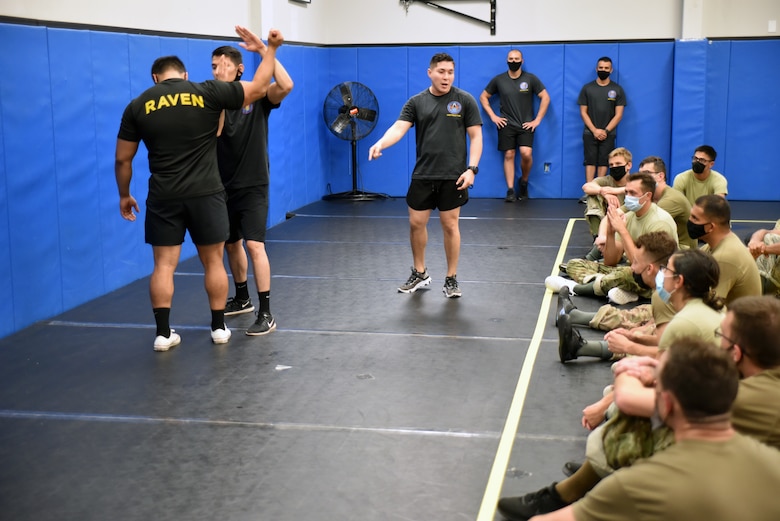U.S. Air Force Expeditionary Center instructors executed the first Phoenix Raven Qualification Course of the year from July 27 - Aug. 19.
Due to the constraints of COVID-19, Phoenix-Raven instructors from the 421st Combat Training Squadron had to completely redesign the PRQC in order to maintain the health and safety of the students and instructors, while also meeting all the training requirements to produce fully qualified Air Force security forces Airmen.
Typically the course is very hands-on, said Staff Sgt. Melida Diaz, 421st CTS Phoenix Raven Qualification Course instructor. "We had to think outside the box and figure out how we can train the students; including combatives and (Armament Systems and Procedures) baton training where they can still receive the training that they need with no contact with the instructors."
The solution was to divide the course into two parts. The first part required 14 days of restriction of movement, or ROM, of the students in Joint Base McGuire-Dix-Lakehurst lodging. During this two-week period, the students were monitored for any symptoms or signs relating to COVID-19.
While the students were restricted to their rooms in lodging, they also had 14 days of virtual training with instructors being available, so they were able to complete most of the academic classes prior to the second part of the training, said Staff Sgt. Alonzo Piper, 421st CTS PRQC instructor.
The PRQC academics covered multiple subjects, such as warrior mindset and comprehensive Airman fitness, arming and use of force, cross-cultural communication, individual protective measures, anti-terrorism, surveying airfields, aircraft familiarization, embassy operations and legal considerations.
Upon completion of the ROM, the students transferred to the 421st CTS student dorms and started 10 days of physical training where they learned verbal judo, various Air Force combatives, weapons defensive principles and the use of the ASP baton.
"We teach Air Force combatives at a comprehensive level," Piper said. "Air Force combatives are self-defense techniques from the ground or standing positions. The standing position is where we teach different strikes, takedowns and different grip techniques to control an individual; and then we go into a ground portion to show how to defend yourself on the ground with the different fighting positions that you can end up in, different submissions or chokes that you can use if you need to use them to defend yourself.
"We teach weapon takeaways and weapon defensive principles as well, it allows us the ability to defend ourselves if we are threatened with weapons when we don't have a weapon to defend ourselves."
Implemented in February 1997 and launched at the then Air Mobility Warfare Center, at Fort Dix, the Phoenix Raven Program ensures protection for Air Mobility Command aircraft operating out of airfields where security is unknown or inadequate. Teams of specially trained and equipped security forces personnel, known as Ravens, deploy aboard AMC aircraft.
"The Ravens are specialized security that go with different aircraft to austere environments. These airfields don't have adequate security and we are there as the insurance policy to get the mission done. The jet, personnel, cargo and everything with it; we're there to secure it, and at the end of the day, that's what it's all about," said Staff Sgt. Tanner Hall, 421st CTS PRQC instructor.
Explaining what distinguishes a Raven, Hall noted the ability to use verbal judo and the ASP baton "are kind of the bread and butter of what makes a Raven, because a lot of these environments we don't necessarily have the capability of taking weapons off the jet, and being able to verbally de-escalate a situation is the key to most of these interactions. However, we have our ASP baton that we drill to perfection as a secondary means of gaining compliance where we might not be able to by other means."
The term "Phoenix Raven" is a combination of the word "phoenix," a standard AMC program prefix and the word "raven," an intelligent bird with keen eyesight.
To become a Raven, students must "pass the evaluations that we have here at the course such as the baton training as well as use of force," Diaz said. "The students also have different types of tests such as the end-of-course exam and a written test for the baton."
She also noted that it was important for the students "to show that they have heart, dedication, a positive attitude and that they are going to be ambassadors for not only security forces but the Air Force."
Upon completion of the qualification course, Phoenix Raven graduates earn an individual Raven Number, owned by them forever.
Raven candidates can volunteer though their unit where they are vetted through their chain of command and selected by their commanders.

Phoenix Raven Qualification Course instructors with the 421st Combat Training Squadron demonstrate weapon defensive principles to students in the U.S. Air Force Expeditionary Center's Redman Room, Aug. 14, 2020, at Joint Base McGuire-Dix-Lakehurst, N.J. The course, which ran from July 27 - Aug. 19, qualified selected security forces personnel to perform as members of a force protection team assigned to deploy with Department of Defense aircraft to austere environments. (U.S. Air Force photo by Maj. George Tobias)






